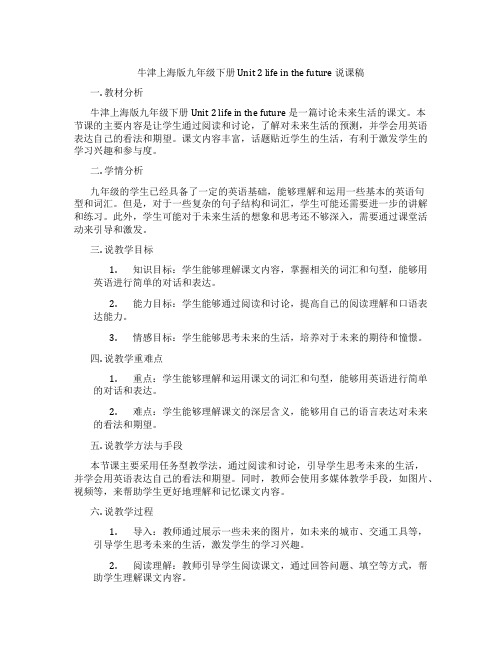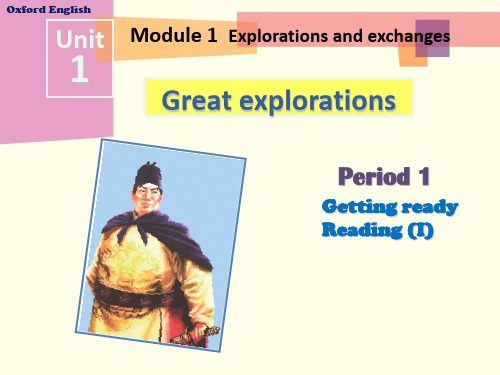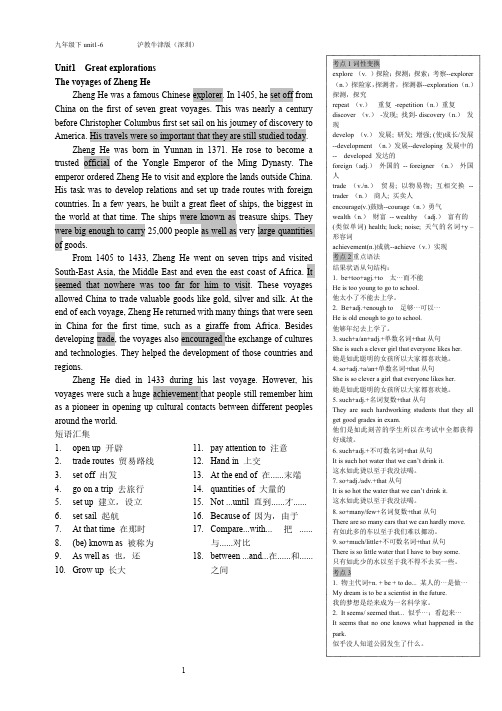沪教牛津版九年级下册英语教材
牛津上海版英语九年级下册《Unit2Lifeinthefuture》说课稿3

牛津上海版英语九年级下册《Unit 2 Life in the future》说课稿3一. 教材分析《牛津上海版英语九年级下册》的Unit 2 “Life in the future” 围绕着未来生活的各个方面进行展开。
本单元的话题贴近学生的生活,能够引发学生的兴趣和思考。
通过学习本单元,学生能够了解和预测未来可能发生的变化,提高他们的想象力和创新思维能力。
二. 学情分析九年级的学生已经具备了一定的英语基础,对于日常生活的话题已经有了一定的了解。
然而,对于未来的预测和想象,他们可能还没有过多的思考和接触。
因此,在教学过程中,我将会引导学生从现实出发,想象和预测未来的生活。
三. 说教学目标1.知识目标:学生能够掌握本单元的单词和短语,理解文章的主旨大意。
2.能力目标:学生能够通过阅读和讨论,提高他们的预测和想象能力。
3.情感目标:学生能够树立正确的价值观,珍惜现在的生活,积极面对未来。
四. 说教学重难点1.教学重点:学生能够理解文章的主旨大意,掌握本单元的单词和短语。
2.教学难点:学生能够通过阅读和讨论,提高他们的预测和想象能力。
五. 说教学方法与手段在教学过程中,我将采用任务驱动法、情境教学法和合作学习法等多种教学方法。
通过设置不同的任务和情境,引导学生主动参与学习,提高他们的预测和想象能力。
六. 说教学过程1.导入:通过展示一些未来的预测图片,引导学生思考未来的生活可能会发生的变化。
2.阅读理解:学生阅读文章,回答相关问题,理解文章的主旨大意。
3.小组讨论:学生分小组讨论,预测未来的生活,并分享自己的观点。
4.输出展示:学生根据讨论的结果,进行小组展示,展示对未来生活的预测。
5.总结反思:学生总结自己的学习过程,反思自己的预测和想象能力。
七. 说板书设计板书设计将包括本单元的主要单词和短语,以及文章的主旨大意。
通过板书的展示,帮助学生复习和巩固所学内容。
八. 说教学评价教学评价将包括过程性评价和终结性评价。
牛津版上海版九年级下册 Unit 3 Going places reading课件 (共19张PPT)

take/how many kinds…
Differences
Hiking
Similarities Skills needed Possible dangers Places Equipment
Group discussion:
1.Which kind of adventure travel would you like to choose?
2.where/when/why/with whom/how would you do it?
3.Safty tips
4.equipment
Homework
2.A CCTV-9 reporter and a traveler who has just come back from rafting. The reporter asks the traveler about his trip, such as how does he feel, what tips he wants to give to others and some interesting or dangerous stories during the trip.
Camping
Diving
Mountain biking
surfing
1.A child and a parent. The child is planning to go hiking ,but the parent thinks that it is too dangerous ,so he doesn’t want his child to go hiking. How can they persuade each other.
沪教牛津版九年级下册英语教材

沪教牛津版九年级下册英语教材Unit1Great exploration ➢单词➢重点短语open up 开辟Hand in 上交go on a trip 去旅行look for 寻找set up 建立;设立Around the world 世界各地set sail 起航such as 例如(be) known as 被称为At the end of 在......末端as well as 也;还Not ...until 直到......才......lead to 导致Because of 因为,由于compare…with…把……与……对比between ...and...在......和......之间➢重点句型1. They were big enough to carry 25,000 people as well as very large quantities of goods.它们足够大,能携带25000 人以及大量的货物。
2. At the end of each voyage, Zheng He returned with many things that were seen in China for the first time, such as a giraffe from Africa.在每次航行结束,郑和带回了许多在中国第一次见到的东西,比如一只非洲长颈鹿。
3. It has become one of the biggest companies in the country.它已经成为了这个国家最大的公司之一。
➢课文翻译Unit1 Reading (书本P3)The voyages of Zheng He郑和下西洋Zheng He was a famous Chinese explorer. In 1405, he set off from China on the first of seven great voyages.郑和是中国著名的探险家。
牛津上海版九年级下册Unit2lifeinthefuture说课稿

牛津上海版九年级下册 Unit 2 life in the future 说课稿一. 教材分析牛津上海版九年级下册Unit 2 life in the future 是一篇讨论未来生活的课文。
本节课的主要内容是让学生通过阅读和讨论,了解对未来生活的预测,并学会用英语表达自己的看法和期望。
课文内容丰富,话题贴近学生的生活,有利于激发学生的学习兴趣和参与度。
二. 学情分析九年级的学生已经具备了一定的英语基础,能够理解和运用一些基本的英语句型和词汇。
但是,对于一些复杂的句子结构和词汇,学生可能还需要进一步的讲解和练习。
此外,学生可能对于未来生活的想象和思考还不够深入,需要通过课堂活动来引导和激发。
三. 说教学目标1.知识目标:学生能够理解课文内容,掌握相关的词汇和句型,能够用英语进行简单的对话和表达。
2.能力目标:学生能够通过阅读和讨论,提高自己的阅读理解和口语表达能力。
3.情感目标:学生能够思考未来的生活,培养对于未来的期待和憧憬。
四. 说教学重难点1.重点:学生能够理解和运用课文的词汇和句型,能够用英语进行简单的对话和表达。
2.难点:学生能够理解课文的深层含义,能够用自己的语言表达对未来的看法和期望。
五. 说教学方法与手段本节课主要采用任务型教学法,通过阅读和讨论,引导学生思考未来的生活,并学会用英语表达自己的看法和期望。
同时,教师会使用多媒体教学手段,如图片、视频等,来帮助学生更好地理解和记忆课文内容。
六. 说教学过程1.导入:教师通过展示一些未来的图片,如未来的城市、交通工具等,引导学生思考未来的生活,激发学生的学习兴趣。
2.阅读理解:教师引导学生阅读课文,通过回答问题、填空等方式,帮助学生理解课文内容。
3.口语表达:教师学生进行小组讨论,让学生用自己的语言表达对未来的看法和期望。
4.写作练习:教师让学生写一篇关于未来生活的短文,让学生能够综合运用所学的词汇和句型。
5.总结:教师对学生的表现进行评价,对课文内容进行总结,引导学生思考未来的生活。
沪教牛津版初中英语九年级下册课文(电脑手机通用版)

中国以外的土地,他的任务是发展关系,
and set up trade routes with foreign countries.
建立与国外贸易通道。
In a few years, he built a great fleet of ships,
He traded valuable goods like gold, silver and silk.
他用贵重商品,如黄金、白银和丝绸做贸易。
Doris: Sorry, I didn't quite catch you.
Doris:对不起,我没听清,
You said he traded gold, silver and…?
In 1271, when he was 17 years old,
1271 年,当他 17 岁的时候,
英中全
he set off on a journey to Asia with his father and uncle,
他跟随他的父亲和叔叔开始了他的亚洲旅程,
and did not return home until 24 years later.
你说他买卖黄金、白银和……?
英中全
Tony: Silk. Once he even brought back a giraffe!
Tony:丝绸,有一次,他甚至带回来一只长颈鹿!
Unit1 More practice
Marco Polo
马可·波罗
By West Lake, in the city of Hangzhou, there is a mall
新沪教牛津版九年级下册英语Unit 6 More practice-Project课件

A Below are three important parts of a healthy lifestyle. In groups of four,
choose one part to work on.
第二十页,共二十五页。
B Each group should brainstorm ideas about the part they have chosen. Use the following
第五页,共二十五页。
Read the first part and finish the diagram.
childhood
(1) _a_d_u__lt_h_o_o_d_
(2) __p_u_b_e_r_t_y__
Effect 1
(3) ___b_o_d_y____
Effect 2
(4) ____m__in_d___
1
people leave childhood and head into
1
adulthood.
Young people begin puberty at different
2
2
ages (from 8 to 15) but plete by 18.
During puberty, young people’s bodies develop
第七页,共二十五页。
Read the second part and write the meaning of each number.
•8
Young people may begin puberty at 8. • 14 or 15
Some young people may not start puberty until 14 or 15.
(完整版)牛津上海版英语九年级下册课件:Unit 2Workbook

7 I ________________ (not sleep), so I got up.
8 I looked into the room. All the people ________________ (listen) carefully to the lecture.
Common error
While I worked hard, you were relaxing.
______________________ ______________________ ______________________ ______________________ ______________________ ______________________
Complete the sentences with the past continuous tense of the verbs in brackets.
1 I ________________ (play) basketball with my friends from three to four o’clock yesterday afternoon.
A Match the words and phrases in Column A with their meanings in Column B. The first one has been done for you.
A
B
1 satisfied a very bad or unpleasant
Combine the two parts of the sentences using while or as and put the verbs in brackets into the past continuous tense. Add commas where necessary. The first one has been done for you.
最新牛津上海版英语九年级下册 Unit 1 Workbook课件

the one here. (not/print/clear) 2 A Why do you spend more time on your English homework than on your maths homework?
Adverbial clauses (Ⅲ)
Common error
Ken behaved so bad that the head teacher had a talk with his parents.
______________________ ______________________ ______________________ ______________________ ______________________ ______________________
6 A Why don’t you take a bus instead of the underground? I always take a bus! B Because the underground ______________________________ a bus. (not/take/much time)
B Because English __________________________ Maths for me!
(not/be/easy)
3 A Why are you using your calculator instead of your brain for your maths homework? B Because my brain _______________________________ my calculator! (not/work/accurate) 4 A Why do you wear the same dress so often, Polly?
新沪教牛津版九年级下册英语Unit 4 More practice-Project课件

Brainstorm ideas with your classmates.
There may be no electricity in people’s homes.
The roads may be covered
with ice.
Crops may freeze to death and farmers may lose their businesses.
3 Did the trouble end when the ice storm stopped? Why or why not? No. Because the huge amount of ice made the whole area very dangerous. As the ice started to melt, it fell from the roofs of buildings and trees like knives. Most of the power lines were so badly damaged that they could not be repaired.
• What damage did the disaster cause? Give some examples.
Some families had no electricity for a whole month. Many homes were damaged and many people, especially farmers, lost their businesses.
第六页,共二十一页。
2 What problems did the ice storm cause? It caused many power lines to fall down and many people had no electricity. It also made the roads dangerous to walk or drive on. In addition, many homes were damaged and many people lost their businesses.
英语牛津上海版九年级下Chapter2Educationalvisits(课件)

Have you ever been aboard?
If you have a chance to go overseas, and which country would you like to go? Why?
Reasons for an Educational Trip?
cannot do in China. • We can visit a school in another country to see
how the students learn there.
What do you know about…?
merlion Singapore/the Lion City
Thailand
World Vision
Ten days
Japan
Japan Airline
Six weeks
A wonderful year in New Zealand
◆ What question worried me when the American Field Service programme accepted me?
• It helps us to see how other people live. • It’s good to learn another language. • It’s nice to make new friends. • We can try other types of food. • We can play sports and activities which we
We were d__e_e_p_l_y__affected by what we saw. There is a big _g_a_p______
新沪教牛津版九年级下册英语Unit 1 More practice-Culture corner课件

Study skills
*Using reference books (5): Using directories
A directory is a book with information about a certain city or area. It usually has different categories and is arranged in alphabetical order. The most mon type of directory is a list of phone numbers.
第八页,共十五页。
B Use the information in the directory to answer the following questions.
527 7177.
Call 999 and say “Police”.
575 4477.
第九页,共十五页。
C Read the remarks below and write down the numbers these people
第四页,共十五页。
A Read this article about Marco Polo. Then answer the questions below.
1 Who was Marco Polo and what was he famous for?
Marco Polo was a traveller and he was famous for his travels across Asia. 2 How were Polo’s stories written down?
Because of his interesting descriptions of Asian life in the book.
牛津上海版九年级下册 Unit 4 All about films and TV说课稿

牛津上海版九年级下册 Unit 4 All about films and TV说课稿一. 教材分析牛津上海版九年级下册Unit 4的主题是“All about films and TV”,主要让学生了解和掌握电影和电视节目的相关词汇和表达方式,同时提高学生的听说读写能力。
本单元共有六个课时,内容包括:电影和电视节目的不同类型、电影和电视节目的制作过程、电影和电视节目对社会的影响、电影和电视节目的评价等。
通过本单元的学习,学生能够更好地了解电影和电视节目,提高他们的文化素养。
二. 学情分析九年级的学生已经具备了一定的英语基础,能够听懂并运用一些基本的日常英语。
但是,对于电影和电视节目的相关词汇和表达方式,他们可能还比较陌生。
因此,在教学过程中,我需要注重引导学生掌握相关词汇和表达方式,并提高他们的听说读写能力。
三. 说教学目标1.知识目标:学生能够掌握电影和电视节目的相关词汇和表达方式,了解电影和电视节目的不同类型及制作过程。
2.能力目标:学生能够运用所学知识进行口语交流,提高听说读写能力。
3.情感目标:学生能够培养对电影和电视节目的兴趣,提高文化素养。
四. 说教学重难点1.重点:电影和电视节目的相关词汇和表达方式的掌握。
2.难点:电影和电视节目的不同类型及制作过程的理解。
五. 说教学方法与手段1.教学方法:采用任务型教学法,让学生在完成任务的过程中,掌握相关词汇和表达方式,提高听说读写能力。
2.教学手段:利用多媒体教学设备,播放电影和电视节目的片段,激发学生的学习兴趣。
六. 说教学过程1.课前准备:让学生提前了解电影和电视节目的不同类型及制作过程,准备相关的词汇和表达方式。
2.课堂导入:通过播放一个电影或电视节目的片段,引导学生进入学习主题。
3.新课呈现:引导学生学习电影和电视节目的相关词汇和表达方式,让学生通过小组合作,总结电影和电视节目的不同类型及制作过程。
4.课堂实践:学生进行角色扮演,运用所学知识进行口语交流。
沪教牛津版初中英语九年级下册课件:Unit 3 The environment

A1 What do you know about the greenhouse effect? Match the first half of the sentences in column A with the second half in column B. Write the correct letters in the blanks.
The atmosphere around the Earth is necessary for all living things. It is like the glass of a greenhouse, letting sunlight in and keeping heat from getting out. Without it, the Earth would be the same as the Moon—cold and lifeless.
Before you read
Look at the article on page 35 and choose the best answer.
Look at the pictures, the title, the introduction and the sub-headings of the article on page 35. Then answer the questions below.
Read the following sentences.
Read the sentences in A1 and answer the questions.
A2 What is the result of the greenhouse effect? In groups, discuss this with your classmates.
牛津上海版英语九年级下册《Unit5AstorybyMarkTwain》说课稿1

牛津上海版英语九年级下册《Unit 5 A story by Mark Twn》说课稿1一. 教材分析《Unit 5 A story by Mark Twn》是牛津上海版英语九年级下册的一篇课文。
本课主要讲述了美国著名作家马克·吐温的一个故事,通过故事使学生了解并感受马克·吐温的作品风格,同时提高学生的阅读理解能力。
教材内容丰富,语言生动有趣,贴近学生生活,有助于激发学生的学习兴趣。
二. 学情分析九年级的学生已经具备了一定的英语基础,能够理解和运用基本的英语语法和词汇。
但他们在阅读理解方面还存在一定的困难,特别是对于长篇阅读材料,可能会感到迷茫。
因此,在教学过程中,需要帮助学生分析文章结构,提高阅读理解能力。
此外,学生对于外国文化还较为陌生,需要通过教材内容来逐渐拓宽视野。
三. 说教学目标1.知识目标:让学生掌握文章中的重点单词和短语,理解文章的基本内容。
2.能力目标:提高学生的阅读理解能力,能够概括文章大意,分析文章结构。
3.情感目标:培养学生对马克·吐温作品的兴趣,感受外国文化的魅力。
四. 说教学重难点1.重点:文章中的重点单词和短语,以及马克·吐温的作品风格。
2.难点:理解文章的深层含义,分析文章结构,提高阅读理解能力。
五. 说教学方法与手段1.教学方法:采用问题驱动法、情景教学法、分组讨论法等,激发学生的学习兴趣,提高学生的参与度。
2.教学手段:利用多媒体课件、图片、视频等辅助教学,帮助学生更好地理解文章内容。
六. 说教学过程1.导入:通过展示马克·吐温的图片和简介,引出本课主题,激发学生的兴趣。
2.阅读理解:让学生独立阅读课文,回答相关问题,检测学生的阅读理解能力。
3.词汇学习:分析文章中的重点单词和短语,让学生通过语境理解词汇含义。
4.文章分析:引导学生分析文章结构,概括文章大意,提高学生的阅读分析能力。
5.分组讨论:让学生分组讨论文章的深层含义,培养学生的合作精神和口头表达能力。
沪教牛津版初中英语九年级下册课件:Unit 1 Great explorations 3.88

The people in the pictures below are all famous explorers. Match them with their achievements. Write the correct letters in the blanks.
Read and predict
Look at the title and the first sentence of each paragraph of the article on page 3. Then answer the questions below.
The voyages of Zheng He
Match
Read the article and match the words with their meanings.
Marco Polo
Marco Polo’s voyian’s
Christopher
opening up of Columbus
the ancient Silk Christopher
Road and
Columbus’s
touring in the discovery of
They are going on a trip. A small suitcase. A bag of lamps and torches. Hi told Lo to “travel light” and Lo thought this meant he should bring things that gave out light with him.
Vocabulary
C1 The words in italics explain the meanings of some words on page 3. Find these words to complete the sentences. Change their forms if necessary.
深圳沪教版初中英语九年级下课文+知识点

Unit1Great explorationsThe voyages of Zheng HeZheng He was a famous Chinese explorer.In1405,he set off from China on the first of seven great voyages.This was nearly a century before Christopher Columbus first set sail on his journey of discovery to America.His travels were so important that they are still studied today.Zheng He was born in Yunnan in1371.He rose to become a trusted official of the Yongle Emperor of the Ming Dynasty.The emperor ordered Zheng He to visit and explore the lands outside China. His task was to develop relations and set up trade routes with foreign countries.In a few years,he built a great fleet of ships,the biggest in the world at that time.The ships were known as treasure ships.They were big enough to carry25,000people as well as very large quantities of goods.From1405to1433,Zheng He went on seven trips and visited South-East Asia,the Middle East and even the east coast of Africa.It seemed that nowhere was too far for him to visit.These voyages allowed China to trade valuable goods like gold,silver and silk.At the end of each voyage,Zheng He returned with many things that were seen in China for the first time,such as a giraffe from Africa.Besides developing trade,the voyages also encouraged the exchange of cultures and technologies.They helped the development of those countries and regions.Zheng He died in1433during his last voyage.However,his voyages were such a huge achievement that people still remember him as a pioneer in opening up cultural contacts between different peoples around the world.短语汇集1.open up开辟2.trade routes贸易路线3.set off出发4.go on a trip去旅行5.set up建立,设立6.set sail起航7.At that time在那时8.(be)known as被称为9.As well as也,还10.Grow up长大11.pay attention to注意12.Hand in上交13.At the end of在......末端14.quantities of大量的15.Not...until直到......才......16.Because of因为,由于pare...with...把......与......对比18.between...and...在......和......之间考点1词性变换explore(v.)探险;探测;探索;考察--explorer(n.)探险家,探测者,探测器--exploration(n.)探测,探究repeat(v.)重复-repetition(n.)重复discover(v.)-发现;找到-discovery(n.)发现develop(v.)发展;研发;增强;(使)成长/发展--development(n.)发展--developing发展中的--developed发达的foreign(adj.)外国的--foreigner(n.)外国人trade(v./n.)贸易;以物易物;互相交换--trader(n.)商人;买卖人encourage(v.)鼓励--courage(n.)勇气wealth(n.)财富--wealthy(adj.)富有的(类似单词)health;luck;noise;天气的名词+y–形容词achievement(n.)成就--achieve(v.)实现考点2重点语法结果状语从句结构:1.be+too+agj.+to太···而不能He is too young to go to school.他太小了不能去上学。
沪教牛津版初中英语九年级下册课件:Unit 6 Caring for your health

Before you read
Look and answer the question.
Look at the title and the sub-headings of the online article on page 83. Then tick (√) the
ways to deal with stress which are probably mentioned in the article.
_____
_B_e p_o_sit_iv_e __ _Le_ar_n _to_re_lax__
_Ta_ke_u_p a_h_ob_b_y
_T_ak_e c_ar_e _of__ _y_ou_r b_o_dy___
_La_ug_h__
Comprehension
D1 Read the online article on page 83 and complete the following notes.
Brainstorm with your classmates suggestions on how to fight stress.
Hang out with our friends and have fun Sing favourite songs
Take a break from what worries us
Read after the recording
Many students suffer from stress in their daily lives. They are under stress because their lives are not balanced. They focus too much on studying, dealing with peer pressure and worrying about what others think, and not enough on other things. You may wonder whether stress is a serious matter. The answer is “Yes”. You should be aware that stress is a risk to your health. If you want to live a long and healthy life, you need to begin to guard against stress from a young age.
- 1、下载文档前请自行甄别文档内容的完整性,平台不提供额外的编辑、内容补充、找答案等附加服务。
- 2、"仅部分预览"的文档,不可在线预览部分如存在完整性等问题,可反馈申请退款(可完整预览的文档不适用该条件!)。
- 3、如文档侵犯您的权益,请联系客服反馈,我们会尽快为您处理(人工客服工作时间:9:00-18:30)。
沪教牛津版九年级下册英语教材Unit1Great exploration ➢单词➢重点短语open up 开辟Hand in 上交go on a trip 去旅行look for 寻找set up 建立;设立Around the world 世界各地set sail 起航such as 例如(be) known as 被称为At the end of 在......末端as well as 也;还Not ...until 直到......才......lead to 导致Because of 因为,由于compare…with…把……与……对比between ...and...在......和......之间➢重点句型1. They were big enough to carry 25,000 people as well as very large quantities of goods.它们足够大,能携带25000 人以及大量的货物。
2. At the end of each voyage, Zheng He returned with many things that were seen in China for the first time, such as a giraffe from Africa.在每次航行结束,郑和带回了许多在中国第一次见到的东西,比如一只非洲长颈鹿。
3. It has become one of the biggest companies in the country.它已经成为了这个国家最大的公司之一。
➢课文翻译Unit1 Reading (书本P3)The voyages of Zheng He郑和下西洋Zheng He was a famous Chinese explorer. In 1405, he set off from China on the first of seven great voyages.郑和是中国著名的探险家。
1405年,他从中国出发,开启了七大航海史上的第一次航行。
This was nearly a century before Christopher Columbus first set sail on his journey of discovery to America.这比哥伦布首次航行发现美洲新大陆早了近一个世纪。
His travels were so important that they are still studied today.他的航行是如此重要,乃至如今仍被研究。
Zheng He was born in Yunnan in 1371. He rose to become a trusted official of the Yongle Emperor of the Ming Dynasty.郑和1371 年出生于云南,后来成为明朝永乐皇帝可信任的官员。
The emperor ordered Zheng He to visit and explore the lands outside China, his task was to develop relations and set up trade routes with foreign countries.皇帝下令郑和造访并探索中国以外的土地,他的任务是发展关系,与外国建立贸易通道。
In a few years, he built a great fleet of ships, the biggest in the world at that time.在几年内,他建造船舶组成了一支庞大的舰队,是当时世界上最大的。
The ships were known as treasure ships. They were big enough to carry 25,000 people as well as very large quantities of goods.这些船被称为宝船,它们大到足以承载25,000 人以及非常多的货物。
From 1405 to 1433, Zheng He went on seven trips and visited South-East Asia, the Middle-East and even the east coast of Africa.从1405 年至1433 年,郑和前后进行了七次航行,造访了东南亚、中东乃至非洲的东海岸。
It seemed that nowhere was too far for him to visit.似乎没有地方是太远他去不了的。
These voyages allowed China to trade valuable goods like gold, silver and silk.这些航行使得中国可以贸易一些诸如黄金、白银和丝绸的贵重物品。
At the end of each voyage, Zheng He returned with many things that were seen in China for the first time, such as a giraffe from Africa.每次航行结束之时,郑和返回时都会带回很多从未在中国见过的东西,譬如来自非洲的长颈鹿。
Besides developing trade, the voyages also encouraged the exchange of cultures and technologies. They helped the development of those countries and regions.除了发展贸易,航行也带动了文化和技术的交流,促进了那些国家和地区的发展。
Zheng He died in 1433 during his last voyage.1433 年,郑和在他的最后一次航行中去世了。
However, his voyages were such a huge achievement that people still remember him as a pioneer in opening up cultural contacts between different peoples around the world.然而,他的航行成就是如此巨大,他仍被人们铭记于心,被视为是开拓世界各地不同民族之间文化交流的先驱。
Unit1 More practice (书本P13)Marco Polo马可•波罗By West Lake, in the city of Hangzhou, there is a small statue of a traveller. His name was Marco Polo.在杭州西湖旁,有一个旅行者的小雕像,他的名字叫马可•波罗。
Marco Polo grew up in the city of Venice, in present day Italy.马可•波罗在威尼斯城长大,在现今的意大利。
In 1271, when he was 17 years old, he set off on a journey to Asia with his father and uncle, and did not return home until 24 years later.1271 年,当他17 岁的时候,他跟随他的父亲和叔叔开始了他的亚洲旅程,并且在长达24 年中一直没有回家。
His travels took him across Asia, along the Silk Road and throughout China.他的旅程横穿亚洲,沿着丝绸之路,游遍整个中国。
He loved Hangzhou so much that he described it as “the finest city in the world”. 他很喜欢杭州,以至于他将其形容为“世界上最好的城市”。
When Polo finally returned to Venice, there was a war and he was captured.当马可•波罗最终回到威尼斯时,当时有一场战争,他被抓获了。
While he was in prison, he told the stories of his travels to another man there.他在监狱里时,他把他的旅行故事告诉了另一个人。
This man wrote the stories down in a book called The Travels of Marco Polo.这个人把这些故事写成了一本书,取名叫《马可•波罗游记》。
Because of the interesting descriptions of Asian life in the book, Polo's travels soon became well known in Europe.因为书中对亚洲生活的精彩描述,很快马可•波罗的旅行在欧洲众所周知。
The stories gave many Europeans their first look at the life and culture of the people in Asia.这些故事让许多欧洲人第一次了解亚洲人民的生活和文化。
Polo told of many amazing things that were unknown to Europe, such as paper money.马可•波罗讲到的许多神奇的东西在欧洲是闻所未闻的,如:纸币。
He also wrote about China's development, with its large cities and systems of communication.他还写了中国的发展,它的大城市以及通信系统。
His book made Europeans more and more interested in the East. It also influenced many other explorers, including Christopher Columbus.他的书让欧洲人越来越对东方感兴趣,这也影响了许多其他的探险家,包括克里斯托弗•哥伦布。
Polo died in 1324. His last words were: “I did not tell half of what I saw.”1324 年,马可•波罗临死前说的最后一句话是:“我看到的,还有一半没有告诉你们。
